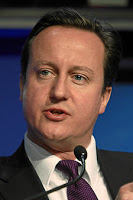Neuroscience
 A psychology study fresh off the presses shows the importance of positive expectations for the successful resolution of awkward negotiations. The results couldn't be more timely as our senior politicians negotiate over terms for a new coalition British government - the first since the 1970s. The finding suggests that the media has a vital role to play. By fostering optimism in the likely success of the negotiations, the media could help increase the likelihood of a successful resolution.
A psychology study fresh off the presses shows the importance of positive expectations for the successful resolution of awkward negotiations. The results couldn't be more timely as our senior politicians negotiate over terms for a new coalition British government - the first since the 1970s. The finding suggests that the media has a vital role to play. By fostering optimism in the likely success of the negotiations, the media could help increase the likelihood of a successful resolution.
 In an initial experiment, Varda Liberman and colleagues had undergrads negotiate with a postgrad (actually a confederate working for the researchers) over the division of university funds between the undergrad and post-grad student populations. Crucially, half the 34 participants were told that every single previous negotiating pair had managed to reach an agreement (the 'Positive Expectations' condition), whereas the other half of the participants acted as a control and were merely told to try their best to reach a mutually acceptable agreement. The negotiations followed a format whereby the confederate made an offer, the participant responded with a counter-offer, and the confederate replied with a final offer that the participant could either accept or reject. The confederate's offers were the same across the two conditions.
In an initial experiment, Varda Liberman and colleagues had undergrads negotiate with a postgrad (actually a confederate working for the researchers) over the division of university funds between the undergrad and post-grad student populations. Crucially, half the 34 participants were told that every single previous negotiating pair had managed to reach an agreement (the 'Positive Expectations' condition), whereas the other half of the participants acted as a control and were merely told to try their best to reach a mutually acceptable agreement. The negotiations followed a format whereby the confederate made an offer, the participant responded with a counter-offer, and the confederate replied with a final offer that the participant could either accept or reject. The confederate's offers were the same across the two conditions.
The key finding was that all 17 participants in the Positive Expectations condition accepted the final offer compared with just 5 out of 17 participants in the control condition. The Positive Expectations students also rated the offers of their negotiating partner, the confederate, as fairer and they felt more satisfied with the negotiation outcome.
 The tension was raised in a second experiment which involved Jewish Israeli Business School students negotiating with an Arab Israeli woman over the division of funds between Israel and Palestine. Again, the positive expectations of half the students was manipulated by telling them that virtually all previous negotiations of this kind had ended in agreement. This time, 31 out 38 students in the Positive Expectations condition accepted their negotiating partner's final offer compared with just 13 out of 38 students in the neutral, control condition. Moreover, the Positive Expectation students were far happier about the negotiation outcome than the control students.
The tension was raised in a second experiment which involved Jewish Israeli Business School students negotiating with an Arab Israeli woman over the division of funds between Israel and Palestine. Again, the positive expectations of half the students was manipulated by telling them that virtually all previous negotiations of this kind had ended in agreement. This time, 31 out 38 students in the Positive Expectations condition accepted their negotiating partner's final offer compared with just 13 out of 38 students in the neutral, control condition. Moreover, the Positive Expectation students were far happier about the negotiation outcome than the control students.
What was going on? Why should the knowledge that comparable prior negotiations ended in success change the way that people negotiate? One reason seemed to be that raised expectations of success led the students to make a more generous counter-offer which meant the gap between their counter-offer and the final offer was smaller. Positive expectations also seemed to change the way that the other party's offers were interpreted. The researchers said that under more pessimistic conditions the other party's offers are interpreted as likely to be in that party's own self interest. By contrast, positive expectations about the negotiation outcome foster a sense that the other party's offers are being made in a more constructive spirit, because they know 'that we need to reach an agreement'.
A problem when it comes to translating the lessons from this research to real life and particularly to the current negotiations among Britain's senior politicians, is that there isn't always a history of success available to inspire optimism. In fact Conservative Prime Minister Edward Heath's attempt to form a coalition with the Liberals in 1974 ended in failure. However, Liberman's team said this needn't be a fatal stumbling block - there are other means of encouraging a sense of optimism and positive expectations for a successful outcome, including 'mutual expressions of goodwill and commitment' or reference to successes in 'previous negotiations between the parties on other, more limited issues.' So far, that's exactly the spirit in which the negotiations seem to be taking place, with politicians on all sides making encouraging comments.
The researchers concluded: 'If our present research gives some basis for optimism about the possibility of bringing theory and research to bear in overcoming barriers to dispute resolution in a strife-worn world, we hope that such optimism will indeed prove to be self-fulfilling, and that practitioners and theorists will be able to find common ground in their efforts to resolve disputes peacefully.'
_________________________________
 Liberman, V., Anderson, N., & Ross, L. (2010). Achieving difficult agreements: Effects of Positive Expectations on negotiation processes and outcomes. Journal of Experimental Social Psychology, 46 (3), 494-504 DOI: 10.1016/j.jesp.2009.12.010
Liberman, V., Anderson, N., & Ross, L. (2010). Achieving difficult agreements: Effects of Positive Expectations on negotiation processes and outcomes. Journal of Experimental Social Psychology, 46 (3), 494-504 DOI: 10.1016/j.jesp.2009.12.010
Post written by Christian Jarrett (@psych_writer) for the BPS Research Digest.
Images courtesy of Wikipedia.
- Using Psychological Negotiating Tricks Can Blowback On You
For some time now negotiation researchers have been telling us we can get ahead by using tactical emotional expressions to manipulate the other party. Show anger to make them worry about threats, or disappointment to nudge them into feeling guilty, and...
- Physical Distance Boosts The Success Of Computer-based Negotiation
A sense of physical distance encourages more abstract thought Negotiations that take place over computer, without face-to-face contact, have more chance of success when those negotiating think there is greater physical distance between each other....
- What Clients Think Cbt Will Be Like And How It Really Is
Some people expect cognitive behavioural therapy (CBT) to be more prescriptive than it is, and therapists to be more controlling than they really are. That's according to a series of interviews with 18 clients who undertook 8 sessions (14 hours) of...
- Effect Of Anger On Negotiations Depends On Cultural Context
The expression of anger in negotiations can be an effective strategy, several studies have shown, because it is interpreted by others as a sign of toughness, thus encouraging them to make concessions. However, there's a hefty caveat to this conclusion...
- Why It's Best Not To Expect The Worst
Go through life expecting the worst and then you’ll never be disappointed. And on those rare occasions when something goes right for you, you’ll be pleasantly surprised. It sounds like a sensible philosophy, but according to Margaret Marshall and...
Neuroscience
Why it's time for the media to help our politicians believe they can succeed
The key finding was that all 17 participants in the Positive Expectations condition accepted the final offer compared with just 5 out of 17 participants in the control condition. The Positive Expectations students also rated the offers of their negotiating partner, the confederate, as fairer and they felt more satisfied with the negotiation outcome.
What was going on? Why should the knowledge that comparable prior negotiations ended in success change the way that people negotiate? One reason seemed to be that raised expectations of success led the students to make a more generous counter-offer which meant the gap between their counter-offer and the final offer was smaller. Positive expectations also seemed to change the way that the other party's offers were interpreted. The researchers said that under more pessimistic conditions the other party's offers are interpreted as likely to be in that party's own self interest. By contrast, positive expectations about the negotiation outcome foster a sense that the other party's offers are being made in a more constructive spirit, because they know 'that we need to reach an agreement'.
A problem when it comes to translating the lessons from this research to real life and particularly to the current negotiations among Britain's senior politicians, is that there isn't always a history of success available to inspire optimism. In fact Conservative Prime Minister Edward Heath's attempt to form a coalition with the Liberals in 1974 ended in failure. However, Liberman's team said this needn't be a fatal stumbling block - there are other means of encouraging a sense of optimism and positive expectations for a successful outcome, including 'mutual expressions of goodwill and commitment' or reference to successes in 'previous negotiations between the parties on other, more limited issues.' So far, that's exactly the spirit in which the negotiations seem to be taking place, with politicians on all sides making encouraging comments.
The researchers concluded: 'If our present research gives some basis for optimism about the possibility of bringing theory and research to bear in overcoming barriers to dispute resolution in a strife-worn world, we hope that such optimism will indeed prove to be self-fulfilling, and that practitioners and theorists will be able to find common ground in their efforts to resolve disputes peacefully.'
_________________________________
 Liberman, V., Anderson, N., & Ross, L. (2010). Achieving difficult agreements: Effects of Positive Expectations on negotiation processes and outcomes. Journal of Experimental Social Psychology, 46 (3), 494-504 DOI: 10.1016/j.jesp.2009.12.010
Liberman, V., Anderson, N., & Ross, L. (2010). Achieving difficult agreements: Effects of Positive Expectations on negotiation processes and outcomes. Journal of Experimental Social Psychology, 46 (3), 494-504 DOI: 10.1016/j.jesp.2009.12.010Post written by Christian Jarrett (@psych_writer) for the BPS Research Digest.
Images courtesy of Wikipedia.
- Using Psychological Negotiating Tricks Can Blowback On You
For some time now negotiation researchers have been telling us we can get ahead by using tactical emotional expressions to manipulate the other party. Show anger to make them worry about threats, or disappointment to nudge them into feeling guilty, and...
- Physical Distance Boosts The Success Of Computer-based Negotiation
A sense of physical distance encourages more abstract thought Negotiations that take place over computer, without face-to-face contact, have more chance of success when those negotiating think there is greater physical distance between each other....
- What Clients Think Cbt Will Be Like And How It Really Is
Some people expect cognitive behavioural therapy (CBT) to be more prescriptive than it is, and therapists to be more controlling than they really are. That's according to a series of interviews with 18 clients who undertook 8 sessions (14 hours) of...
- Effect Of Anger On Negotiations Depends On Cultural Context
The expression of anger in negotiations can be an effective strategy, several studies have shown, because it is interpreted by others as a sign of toughness, thus encouraging them to make concessions. However, there's a hefty caveat to this conclusion...
- Why It's Best Not To Expect The Worst
Go through life expecting the worst and then you’ll never be disappointed. And on those rare occasions when something goes right for you, you’ll be pleasantly surprised. It sounds like a sensible philosophy, but according to Margaret Marshall and...
